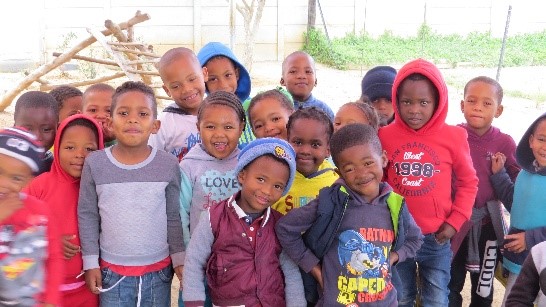.JPG)
Food For Us Project Update
03 November 2017
Towards the end of November, the South African Food For Us team had the privilege of hosting Ryu Koide and Stefanie Chan from the UNEP 10YFP programme in both Grahamstown and Stellenbosch. Our guests travelled to South Africa to observe the progress of the project, understand the context in which we are working and discuss strategies of scalability for the project.
The Food For Us team in the Western Cape and the Eastern Cape arranged a number of strategic meetings while also making sure there was time to visit the field and view the project in context.
On the 25th October, Mr. Koide and Ms. Chan accompanied the Western Cape Food For Us team to visit the new identified Worcester Food For Us hub. This hub will participate in the first Application training workshop where the application will be trialled in the Avian Park community. This community has an active community-based home vegetable growing network that provides food to early childhood development centres and other community development institutions. Trial participants gave the application developers an opportunity to explain how to download and register and then a basic introduction on how the application works.
.jpg)
Figure 1. Community vegetable garden of potential trial participants in Avian Park, Worcester(Western Cape Food For Us)
Food For US team was shown one of the community gardens run by a very innovative and passionate group of Avian Park residents. This garden provides produce for the local old age home and is used for subsistence for those working in the garden. The community members who care for this garden also run a small seedling nursery where they nurture the growth of small vegetable seedlings which are then sold to members of the community to plant in their own home vegetable gardens. The garden produces large amounts of produce and not all of it is distributed, therefore portraying a need for a system that links these community garden farmers to alternative markets for their surplus produce.
Our visit to the community garden was followed by a quick visit to the local Early Childhood Development Centre and community soup kitchen. Both the Early Childhood Development Centre and the Soup kitchen are supplied by community vegetable gardens that are maintained on the property by the active community Garden Club. The teachers at the ECD centre and the women working in the Soup Kitchen both agreed that it is very important to have fresh nutritious produce to feed the children and community members. Food For Us hopes to work with these community development organisations to make the trading of fresh produce more efficient and easier.

Figure 2. Children at the Avian Park Early Childhood Development Centre in Worcester.
The visit to Worcester was incredibly insightful for the Food for Us research team, and it provided a good overview of the Western Cape context for our overseas guests.
The Eastern Cape portion of the visit was equally fruitful as it gave the project team, Mr. Koide and Ms. Chan an opportunity to go through the detailed structure of the project in great depth. The focus was on working towards a scalability model for the future of the application.
Following the meeting at the ELRC in Grahamstown, Eastern Cape on the Friday morning, the team travelled to Alice, Eastern Cape, to meet with the Raymond Mhlaba Development Agency (RMDA) to discuss the role out of the application in the Raymond Mhlaba Municipality. This meeting was lead by Mr. Mali and Mr. Dongi (The RMDA Chairman and project manager respectively) who described the RMDA’s involvement in the Food For Us pilot project and the progress made in the Raymond Mhlaba area thus far.
Some of the trial participants from the Mxumbu Youth Co-operation also joined the meeting to meet our guests and discuss the challenges and potential value that they have observed from starting to work with the application. The team spent the remainder of the afternoon working through the application with the Mxumbu Youth participants as a form of informal application training. The team also used this opportunity to pinpoint any further technical challenges that the participants may be experiencing while using the application.
.JPG)
Figure 3. Eastern Cape Food For Us team working through the App with Mthembu Youth co-op(Alice, Eastern Cape)
This visit to Alice provided Mr. Koide and Ms. Chan a chance to meet the participants of the trial and to understand the context in which they work, noting the stark difference between the Eastern Cape and Western Cape context.
The week of field trips and project meetings was a fantastic opportunity for the project team to share the work that has been done on the project this far. It also provided an opportunity to reflexively look at the goals of the project and how the team is hoping to achieve them. We thank Mr. Koide and Ms. Chan for their insight and enthusiasm to fully engage in our project. We look forward to showing you our progress in your next visit!
By Sarah Durr, M.Ed researcher
November 2017
